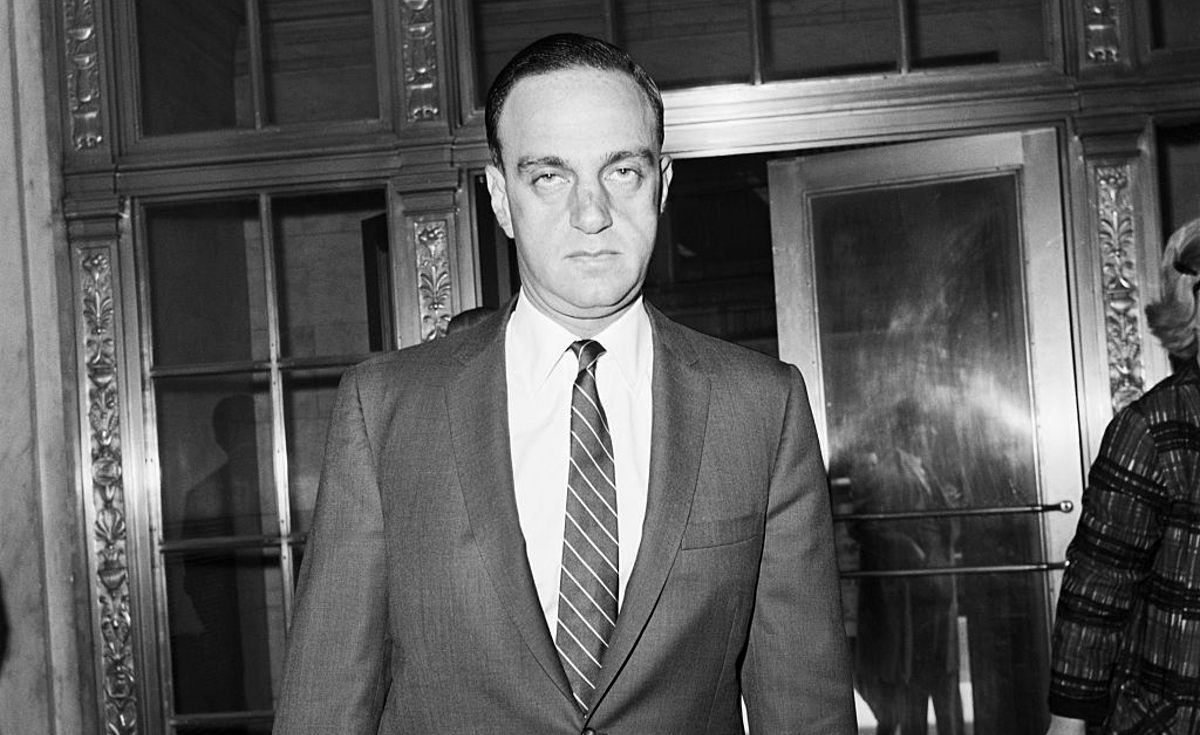Controversial political figure Roy Cohn is getting the spotlight in two historical dramas: Showtime’s Fellow Travelers, and a new movie about a young(er) Donald Trump.
Fellow Travelers is a series that follows the love story between two men and how it intersects with American history. A new movie called The Apprentice, starring Sebastian Stan as Donald Trump for some terrible reason, shows Trump’s life in the 1980s and 1990s. What could these two very different dramas have in common? Both feature storylines revolving around the same man, Roy Cohn. In Fellow Travelers, Will Brill (The Marvelous Mrs. Maisel) plays Cohn. Jeremy Strong (Succession) will play an older version of the same man in The Apprentice.
Cohn helped fuel both the Red and Lavender Scares of the 1950s. He later acted as a mentor to Trump. Cohn was also a closeted gay man who died of AIDS during the peak of the epidemic in the late 1980s. It’s time we unpacked the legacy of Roy Cohn.
Roy Cohn and Senator Joseph McCarthy
Roy Cohn first popped up on the national radar when he worked as a prosecuting attorney in the trial of Julius and Ethel Rosenberg, a couple convicted and later executed for sharing United States secrets with the Soviet Union. Some of the central testimony used to convict the Rosenbergs came from Ethel’s brother, David Greenglass, who was directly examined by Cohn. (Greenglass later recanted his testimony and claimed he committed perjury “to protect himself and his wife, Ruth, and that he was encouraged by the prosecution to do so.”)
Due to his work on the Rosenberg case, Cohn caught the attention of higher-ups in the U.S. government, which led to his appointment as Senator Joseph McCarthy’s chief counsel.
Together, Cohn and McCarthy fanned the flames of both the Red Scare and the Lavender Scare. The two ruthlessly accused people—i.e., anyone who disagreed with the status quo of the government—of being communists. Cohn and McCarthy also pushed the narrative that any homosexual people working in the government were open to blackmail by foreign threats and should be exposed for being gay. The key piece of legislation used was President Eisenhower’s Executive Order 10450, barring anyone “untrustworthy” from being in the government. The Lavender Scare ruined lives. Some people chose to take their own lives before the government could expose their secrets.
Cohn’s government work culminated in 1954 with the Army-McCarthy hearings. When the Army drafted G. David Schine, another McCarthy staff member, Cohn tried to stop it by arguing for special treatment for Schine. When his demands weren’t met, Cohn began an intense “investigation” into communists in the Army. Many believed Schine and Cohn had a romantic relationship, though the latter publicly denied that he was gay until his death.
While McCarthy accused the Army of misconduct, the Army turned the same accusations back onto McCarthy’s staff. The hearings ended with McCarthy being censured and Cohn’s resignation.
Roy Cohn and Trump
Cohn relocated from Washington to New York and started working as a private attorney. As an attorney, Cohn had a wide range of clients, such as the mobster John Gotti, the owners of Studio 54, and Donald Trump. During Cohn’s career as an attorney, he was accused multiple times of tax evasion, fraud, and witness tampering, among other illegal activities. Eventually, the State of New York disbarred Cohn not long before his death.
Some of Cohn’s closest friends included the Reagans, Roger Stone, and Donald Trump. As pointed out in two different documentaries about him—Where’s My Roy Cohn? and Bully, Coward, Victim: The Story of Roy Cohn—Cohn started Trump’s path to the presidency. Cohn considered Trump his best friend, and he acted as a mentor to the businessman. Through Cohn, Trump made friends with Roger Stone and Rupert Murdoch, the owner of Fox News. Both Stone and Murdoch played major roles in getting Trump elected through “fake news” campaigns and illegal activities.
By all accounts, Cohn was an angry guy who wanted to pick a fight with everyone and prioritized fame and fortune over people. Cohn was a closeted gay man who actively attacked the gay community. Even while dying of AIDS, he did nothing to convince President Reagan to help others with the disease. He died in 1986 at only 59 years old. Some sources allege his last phone call was to Trump.
Cohn is immortalized on the AIDS Memorial quilt. His square, made by an anonymous person, only says his name and the words: “Bully, Coward, Victim.” Many people may not even know about Roy Cohn, but we are still feeling the effects of his actions.
(featured image: Getty Images / Bettmann)









Published: Dec 13, 2023 01:13 pm